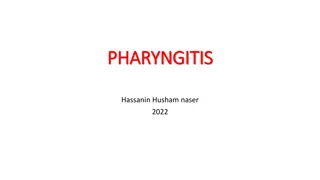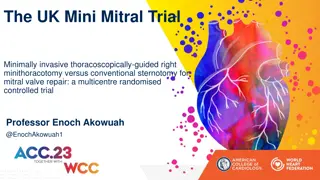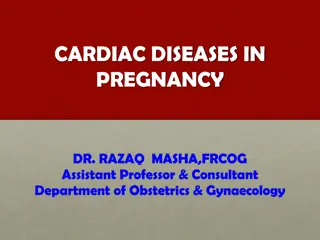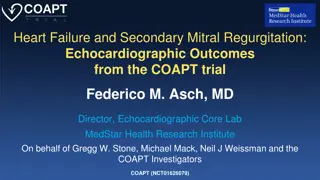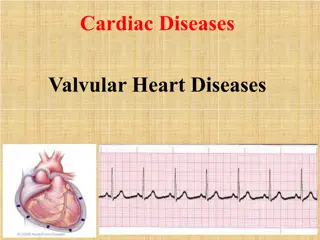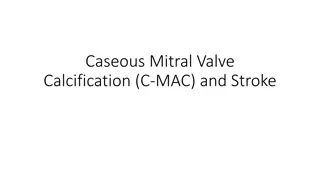ALIGN.AR Trial: JenaValve Trilogy for Aortic Regurgitation
The ALIGN.AR trial evaluates Trilogy THV system in high-risk patients with severe aortic regurgitation. Untreated AR is linked to high mortality, emphasizing the need for safe alternative interventions like TAVR devices. The study aims to demonstrate safety and effectiveness of the Trilogy valve in
0 views • 37 slides
Infectious Endocarditis
A 22-year-old female patient with a history of infected endocarditis and recent dental procedure presents with high-grade fever, chills, shortness of breath, and arthralgia. Examination reveals a pan systolic murmur and tachycardia. Echocardiography shows mitral regurgitation with vegetation on the
1 views • 32 slides
Pharyngitis: Causes, Symptoms, and Management
Pharyngitis is an inflammation of the pharynx characterized by coughing, painful swallowing, and appetite changes. It can be caused by physical or infectious factors, leading to symptoms such as virtual obstruction, regurgitation, and drooling. Understanding the etiology and pathogenesis is crucial
1 views • 32 slides
UK Mini Mitral Trial: Minimally Invasive Thoracoscopic Approach vs Conventional Sternotomy for Mitral Valve Repair
The UK Mini Mitral Trial compares the outcomes of minimally invasive thoracoscopic-guided right minithoracotomy versus conventional sternotomy for mitral valve repair. The trial aims to determine if physical function improvement post-surgery at 12 weeks is superior in the minimally invasive approach
1 views • 24 slides
Cardiac Diseases in Pregnancy: Implications and Management
Normal pregnancy induces significant physiologic changes in the cardiovascular system, which can impact women with pre-existing cardiac diseases. Understanding the New York Heart Association classification scheme is crucial for assessing symptomatology during pregnancy. Rheumatic Heart Disease, part
0 views • 12 slides
Achalasia
Achalasia is characterized by a failure of the lower esophageal sphincter to relax, leading to difficulty in swallowing and regurgitation. The exact cause is unknown, but autoimmune factors and chronic infections may play a role. Symptoms include dysphagia, chest pain, regurgitation, and weight loss
0 views • 59 slides
Chronic Primary Mitral Regurgitation: Evaluation and Management Considerations
Chronic primary mitral regurgitation (MR) presents various considerations in evaluating severity, symptoms, left ventricular function, and candidacy for mitral valve repair. The management decision involves assessing imaging findings, LV function, and the impact on mortality and quality of life. Sur
0 views • 9 slides
Echocardiographic Outcomes in Heart Failure Patients with Secondary Mitral Regurgitation: COAPT Trial
This study presents the echocardiographic outcomes from the COAPT trial focusing on heart failure patients with secondary mitral regurgitation. The trial evaluated the impact of MitraClip therapy in conjunction with guideline-directed medical therapy compared to medical therapy alone. Results showed
0 views • 27 slides
Comparison of Valve Types and Anesthesia Strategies in Transcatheter Aortic Valve Implantation
In the SOLVE-TAVI trial, patients undergoing transcatheter aortic valve implantation were randomized to receive either self-expandable or balloon-expandable valves under general or local anesthesia. The study aims to compare the effectiveness and safety of different valve types and anesthesia approa
0 views • 27 slides
Heart Sounds and Murmurs in Cardiovascular Physiology
This detailed lecture covers the basics of normal and abnormal heart sounds, stethoscope placement, cardiac auscultation, and the physiological significance of heart murmurs. It explains the causes, descriptions, and grading of abnormal heart sounds, along with specific conditions like aortic stenos
0 views • 26 slides
Mitral Stenosis: Causes, Symptoms, and Pathophysiology
Mitral stenosis is a valvular heart disease characterized by narrowing of the mitral valve orifice, leading to decreased blood flow and various complications. Rheumatic fever is a common cause, with thickening and calcification of valve tissue leading to pulmonary hypertension and heart failure. Exp
0 views • 31 slides
Caseous Mitral Valve Calcification (C-MAC) and Stroke: Overview and Management
Caseous Mitral Valve Calcification (C-MAC) is a rare condition characterized by spectrum liquefaction necrosis of the mitral annular calcification (MAC), potentially leading to cardiovascular complications like strokes and emboli. This article discusses the features, diagnostic aspects, and treatmen
0 views • 7 slides
Tiger Stripes Sign in Cardiology
Tiger Stripes Sign, also known as Zebra Stripes Appearance, is a unique Doppler signal observed in cardiac imaging, commonly associated with valvular regurgitation. It is characterized by high-amplitude band-like signals and may indicate complications like flail prosthetic valves. The mechanism behi
0 views • 7 slides


